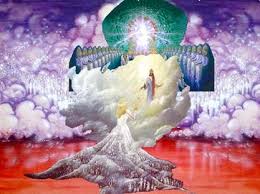A question I received:
"The rider of the white horse in Rev.6:2, wears one crown. Whereas most certainly Jesus, "the faithful and true" rider, wears many crowns (Rev.19:12). "A wife of noble character, is her husband's crown" (Prov.12:4). Rev.19:14, "And the armies of heaven, clothed in fine linen white and clean, followed him on white horses", His bride (Rev.19:8). So I am wondering why the rider in Rev.6:2 wears only one crown.
My reply:
At Rev.1:19 we are told by Jesus, that what is depicted in the scroll of Revelation covers more than one era. It depicts what exists, current to John... as well as depictions of what would be the future to John. From this, the discrepancy in the number of crowns may be explained by the timing of the scenes.
In the first century, Jesus alone was a conqueror (John16:33; 15:18; 16:1-2,4). As a result, he received authority and power from God (John3:35; Matt.28:18), and sat on God's throne as God's right-hand man (Mark 16:19; Luke22:69; Ps.110:1; 1Cor.15:25; Rev.3:21; 2:26-27).
As it states at Rev.6:2; "and a crown was given to him, and he went out conquering and to conquer." (1Cor.15:25) - Rev.6:2 sounds like it is describing when Jesus is initially receiving kingship, at the start of his spiritual battles. It appears to be the arrival of Jesus when starting his ministry. He certainly did battle with the religious leaders, and spoke of himself as a king, before his death (John18:36-37)
(Matt.2:2; Zech.9:9; Mark 11:7; John1:49).
In addition to authority and power, crowns can also symbolize spirit life (James 1:12; Rev.2:10). Jesus was put to death in the flesh, was raised in spirit, and is alive forever and ever (1Pet.3:18; 1Cor.15:45; Rev.1:18). One crown (John16:33; Rev.14:14). At Revelation 14:14, we see Jesus in only one crown (and a sharp sickle for harvesting). We may have believed that this scene only takes place in the time of the end, when Jesus should have many crowns... But Jesus started harvesting, in the first century (John4:35-36; Matt.9:37-38; 3:12). God gave Jesus authority to lay down his life, and to take it up again (John10:18). Afterward, Christ becomes the source of life to others... and others join him as conquering victors (Rev.3:21; 2:10; 17:14; 5:9-10; 20:4,6; 2Tim.2:12; 4:8).
(https://pearl-kingsofearth.blogspot.com)
 Rev.1:5-6; 5:9-10; Dan.2:44
Rev.1:5-6; 5:9-10; Dan.2:44
(https://pearl-kingsofearth.blogspot.com)

"The rider of the white horse in Rev.6:2, wears one crown. Whereas most certainly Jesus, "the faithful and true" rider, wears many crowns (Rev.19:12). "A wife of noble character, is her husband's crown" (Prov.12:4). Rev.19:14, "And the armies of heaven, clothed in fine linen white and clean, followed him on white horses", His bride (Rev.19:8). So I am wondering why the rider in Rev.6:2 wears only one crown.
My reply:
At Rev.1:19 we are told by Jesus, that what is depicted in the scroll of Revelation covers more than one era. It depicts what exists, current to John... as well as depictions of what would be the future to John. From this, the discrepancy in the number of crowns may be explained by the timing of the scenes.
In the first century, Jesus alone was a conqueror (John16:33; 15:18; 16:1-2,4). As a result, he received authority and power from God (John3:35; Matt.28:18), and sat on God's throne as God's right-hand man (Mark 16:19; Luke22:69; Ps.110:1; 1Cor.15:25; Rev.3:21; 2:26-27).
As it states at Rev.6:2; "and a crown was given to him, and he went out conquering and to conquer." (1Cor.15:25) - Rev.6:2 sounds like it is describing when Jesus is initially receiving kingship, at the start of his spiritual battles. It appears to be the arrival of Jesus when starting his ministry. He certainly did battle with the religious leaders, and spoke of himself as a king, before his death (John18:36-37)
(Matt.2:2; Zech.9:9; Mark 11:7; John1:49).
In addition to authority and power, crowns can also symbolize spirit life (James 1:12; Rev.2:10). Jesus was put to death in the flesh, was raised in spirit, and is alive forever and ever (1Pet.3:18; 1Cor.15:45; Rev.1:18). One crown (John16:33; Rev.14:14). At Revelation 14:14, we see Jesus in only one crown (and a sharp sickle for harvesting). We may have believed that this scene only takes place in the time of the end, when Jesus should have many crowns... But Jesus started harvesting, in the first century (John4:35-36; Matt.9:37-38; 3:12). God gave Jesus authority to lay down his life, and to take it up again (John10:18). Afterward, Christ becomes the source of life to others... and others join him as conquering victors (Rev.3:21; 2:10; 17:14; 5:9-10; 20:4,6; 2Tim.2:12; 4:8).
(https://pearl-kingsofearth.blogspot.com)
 Rev.1:5-6; 5:9-10; Dan.2:44
Rev.1:5-6; 5:9-10; Dan.2:44 (https://pearl-kingsofearth.blogspot.com)
In Rev.5:6-7, at the point when Jesus receives the scroll, we see Jesus symbolized
as a Lamb with seven horns that have seven eyes, which contain the seven spirits of God.
We know from Rev.17:12 that horns are kings.
Yet at Rev.5:6 when Jesus is receiving the knowledge of Revelation, the 7 horns/kings/stars/'angels'-Greek:"messenger")/prophets of Jesus (Rev.1:20; Phil.2:15; Dan.12:3), have not yet been given their full insight/spirit/eternal life/crown, or received their kingdom which results
(1Pet.1:10-12; Matt.13:17; James 1:23; 1Cor.13:12,9-10; Dan.12:9).
(https://4womaninthewilderness.blogspot.com/2017/07/who-are-fallen-stars-of-rev124.html)
(1Pet.1:10-12; Matt.13:17; James 1:23; 1Cor.13:12,9-10; Dan.12:9).
(https://4womaninthewilderness.blogspot.com/2017/07/who-are-fallen-stars-of-rev124.html)
Full and complete insight is given as the scroll is unsealed, in the time of the End
(Matt.10:41; Dan.12:4,9-10,3; Rev.22:10,6-7,16; John13:20; 15:26; 16:7-8,12-13; Rev.1:1; Mal.3:1-3).
(Matt.10:41; Dan.12:4,9-10,3; Rev.22:10,6-7,16; John13:20; 15:26; 16:7-8,12-13; Rev.1:1; Mal.3:1-3).
The full reward to inherit the Kingdom of God, must await the demise of the last harlot/false prophet, and her Beast
(Rev.11:15-16,17-18)(Rev.6:9-11; 19:2,20; 20:9-10) (Dan.7:21-22,25-27; Matt.24:46-47).
(Rev.11:15-16,17-18)(Rev.6:9-11; 19:2,20; 20:9-10) (Dan.7:21-22,25-27; Matt.24:46-47).
The horns on Satan and his beast, contain their worldly crowns (1John5:19; Luke 4:5-6; Rev.12:3; 13:1-2; 1Cor.4:8; Rev.3:17-18). It is of interest however, that at Rev.17:3,7; the beasts horns do not
have their crowns. That is consistent with Rev.17:12, as kings who have not yet received their kingdom.
The 7 heads (harlots/false prophets) of the beast however, are ruling the beast (Deut.28:13; Rev.17:9-10,9 NIV) You will see that those 7 heads, are also symbolized as seven hills/mountains. This indicates to us, that they are a prominent leader (on a hill), and viewed as a source of spiritual light (burning/blazing as a lamp) (Rev.17:9 NIV; Matt.5:14-15; Rev.8:10-11 KJV) such as was the prophet, John the baptist (John5:35).
Then Rev.19 opens with a depiction of the period of time, which contains the victorious great crowd... the condemning of the harlot... and the 24 elders (who each have their victory crown
-Rev.4:4,10).
Rev.19:7 times this with the wedding of the Lamb. It is at this point, that Jesus is seen with many crowns, and is called, king of kings (Rev.19:12,16).
Verse 14 tells us that the armies of heaven are with Jesus in this final battle
(Rev.17:14; 2:26-27; Luke10:17-20; 2Cor.10:3-5; Eph.6:12; 5:11; 2:6; Col.3:1).
At that point, Jesus is certainly credited with the victories and sovereignty of all those who have conquered, gained life, and have received their crowns.
(Rev.17:14; 2:26-27; Luke10:17-20; 2Cor.10:3-5; Eph.6:12; 5:11; 2:6; Col.3:1).
At that point, Jesus is certainly credited with the victories and sovereignty of all those who have conquered, gained life, and have received their crowns.
To summarize, perhaps the
amount
of crowns, represent not only being a
conqueror, yourself, but also,
*how many conquerors are to your own credit (Jesus can be credited with our own victory, even more than we
(1Cor.15:57; Rom.8:37; Rev.4:10-11),
(1Cor.15:57; Rom.8:37; Rev.4:10-11),
*how
much authority and power one has received (the more kings
you rule over, the more crowns -Rev.19:16), and
*how
many lives you can be credited with as saving.
While anointed
kings and priests may be thought of as saving other lives (Rev.5:9-10; Mal.2:7)... I don't see that credit, as completely true.
It is the gospel of Christ that does the saving (Rom.1:16), and God that causes spiritual growth (1Cor.3:6). All goodness and life, trace back to God (Ps.36:9; John12:49-50).
It is enough for an anointed king, through their righteousness (Rev.19:8,14; John7:16-18), to choose life for themselves through righteousness, faith, and obedience (Eze.14:12,14; Heb.10:38; 1John5:4).
During Armageddon especially, that becomes an individual decision (Mark 8:35; Rom.14:12; 2:6; Rev.22:12)
(Joel 3:14; Jer.21:8; Matt.7:13-14; Deut.30:19; Isa.1:19-20; Rev.2:16; John12:48).
(Joel 3:14; Jer.21:8; Matt.7:13-14; Deut.30:19; Isa.1:19-20; Rev.2:16; John12:48).
Joel 3:14
As
far as Prov.12:4 goes... At the point that Jesus had one crown (first century)... he had established the New Covenant by virtue of his blood (Luke 22:20; Heb.10:19; 9:22; Rev.5:9-10; Eph.5:25,23; John15:13-14,9-10). The first candidates for his bride, had begun... the foundation stones (Rev.21:9-10,11-12,13-14). The provision for "her" faithful members to be credited with life,
was then guaranteed. In that, Jesus could certainly be credited with giving up himself for "her" (Eph.5:25-27), and even qualifying her for life, through his oversight in her sanctification, so that she could finally be presented to him without a spot or wrinkle
from the world
(Eph.5:27; 2Pet.3:14; James 1:27; 1Thess.5:23; 2Cor.7:1; Phil.2:15; 1Tim.6:11-12,13-14; 1Pet.1:7).
At the point in time that Jesus gives his life to secure the life of his bride;
Jesus is worthy of presiding over her members (Eph.1:22; 4:15; 5:22-23; Col.1:18; 2:9-10). He could receive a crown, signifying the sure-to-be reality of "an excellent wife" (Prov.12:4).
Whether the single crown on the head of Jesus was his own reward for faithfulness, or was a sign of achieving an excellent wife;
Whether the single crown on the head of Jesus was his own reward for faithfulness, or was a sign of achieving an excellent wife;
Both were achieved at once (Rev.5:9-10), and are a blessing from our Father in heaven
(Prov.18:22; 19:14; Heb.2:9-10; 1:2-4,5-7,8-9).

